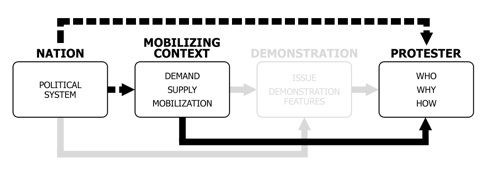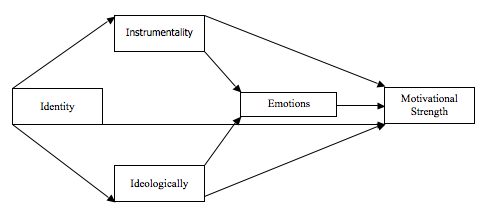The Netherlands
Our understanding of why people participate in protest is far from complete. Why is the one grievance translated into mobilization rather than another? or why does the same problem in one country lead to mobilization whereas other countries remain quiet? These questions refer to a thorny but underexposed issue in the literature: the processes by which in a society demand for protest develops and supply factors transform willingness to participate into actual participation (Klandermans 2004). This project aims to explore this issue by investigating the influence of national socio-political and mobilizing context on protest participation. In doing so we cross interdisciplinary boundaries by incorporating social-psychological theories describing demand factors and sociological and political science theories describing supply factors and mobilization.
Previous studies on motivational dynamics of protest left the influence of national and mobilising context on protest participation completely out (van Stekelenburg et al. 2008b). These studies typically focus on a single demonstration within a single nation which inevitably takes contextual variation away. Therefore, much of what we know lacks contextualisation. We maintain that each decision to participate in protest originates in the national socio-political and mobilising context.
Only comparative approaches that take the influence of socio-political and mobilising surroundings into account provide an adequate explanation of protest participation. To ensure the quality of comparative research that combines structural and individual factors in explaining protest participation an interdisciplinary team employing a standardized research design, methods and measures comprised of sociologists, political scientists and social psychologists is a necessity.
The Dutch team aims to study the reasons why people participate in protest. We plan to investigate how motives and emotions to participate in protest originate in and are coloured by the socio-political factors of the national and mobilising context. We employ a comparative design in a study that crosses interdisciplinary boundaries by incorporating social-psychological theories describing demand factors and sociological and political science theories describing supply factors and mobilization (See Figure 1).
Figure 1: Research interest The Netherlands

Previous studies on motivational dynamics of protest left the influence of national and mobilising context on protest participation completely out (van Stekelenburg et al. 2008b). These studies typically focus on a single demonstration within a single nation which inevitably takes contextual variation away. Therefore, much of what we know lacks contextualisation. We maintain that each decision to participate in protest originates in the national socio-political and mobilising context.
Only comparative approaches that take the influence of socio-political and mobilising surroundings into account provide an adequate explanation of protest participation. To ensure the quality of comparative research that combines structural and individual factors in explaining protest participation an interdisciplinary team employing a standardized research design, methods and measures comprised of sociologists, political scientists and social psychologists is a necessity.
The Dutch team aims to study the reasons why people participate in protest. We plan to investigate how motives and emotions to participate in protest originate in and are coloured by the socio-political factors of the national and mobilising context. We employ a comparative design in a study that crosses interdisciplinary boundaries by incorporating social-psychological theories describing demand factors and sociological and political science theories describing supply factors and mobilization (See Figure 1).
Figure 1: Research interest The Netherlands
Over the last two decades, social psychologists investigated the motivational dynamics of protest. They began by demonstrating that instrumental reasoning steered by perceived efficacy influences people’s motivation to participate in protest (e.g., Klandermans 1984). Followed by identification (e.g., Simon et al. 1998), and emotions (e.g., van Zomeren et al. 2004). In our own research we integrated these three motives into a single model and added an ideological motive (i.e. expressing one's view after violated values, van Stekelenburg et al. 2008a, see Figure 2). A study we conducted suggests that the mobilising context influences this motivational constellation: protesters identifying with the labour movement take the instrumental route while protesters identifying with the anti-neo liberal movement take the ideological route (van Stekelenburg et al. 2008b)
Figure 2: Protest participation model.

In nearly all the routes to protest participation emotions provide an extra―amplifying or accelerating―motivational push (van Stekelenburg and Klandermans 2007). Indeed, politics of protest are full of emotions. Little is known about how emotions influence protest behavior. One promising social psychological approach in that regard is that on group-based emotions, implying that people experience emotions on behalf of their group membership (e.g. Smith 1999). As protest participation is group-based, group-based emotions should play an important role in protest participation. Whereas in social psychological literature only group-based anger is considered as the relevant action-based emotion, sociologists point to a variety of ‘protest emotions’ such as indignation (Elster 1996), solidarity, pride and fear (Jasper 1998). Combining the sociological and social psychological literature on emotions we will explore the influence of a variety of (group-based) emotions.
In earlier studies of protest participation much attention was given to instrumentality. A narrow focus on instrumentality fails to disclose other motivations, such as strengthening solidarity, engaging third parties (Simon and Klandermans 2001) or the urge to express one’s values (van Stekelenburg and Klandermans 2007; van Stekelenburg et al. 2008a). By adding these predictors in our model we aim to get a more comprehensive, and accordingly, more accurate picture of why people protest.
Figure 2: Protest participation model.

In nearly all the routes to protest participation emotions provide an extra―amplifying or accelerating―motivational push (van Stekelenburg and Klandermans 2007). Indeed, politics of protest are full of emotions. Little is known about how emotions influence protest behavior. One promising social psychological approach in that regard is that on group-based emotions, implying that people experience emotions on behalf of their group membership (e.g. Smith 1999). As protest participation is group-based, group-based emotions should play an important role in protest participation. Whereas in social psychological literature only group-based anger is considered as the relevant action-based emotion, sociologists point to a variety of ‘protest emotions’ such as indignation (Elster 1996), solidarity, pride and fear (Jasper 1998). Combining the sociological and social psychological literature on emotions we will explore the influence of a variety of (group-based) emotions.
In earlier studies of protest participation much attention was given to instrumentality. A narrow focus on instrumentality fails to disclose other motivations, such as strengthening solidarity, engaging third parties (Simon and Klandermans 2001) or the urge to express one’s values (van Stekelenburg and Klandermans 2007; van Stekelenburg et al. 2008a). By adding these predictors in our model we aim to get a more comprehensive, and accordingly, more accurate picture of why people protest.
Affiliated researchers:
- Bert Klandermans | VU-University
- Jacquelien van Stekelenburg | VU-University
- Dunya van Troost | VU-University
- Anouk van Leeuwen | VU-University
- Reserve assistent |
- Marie-Louise Damen | VU-University





